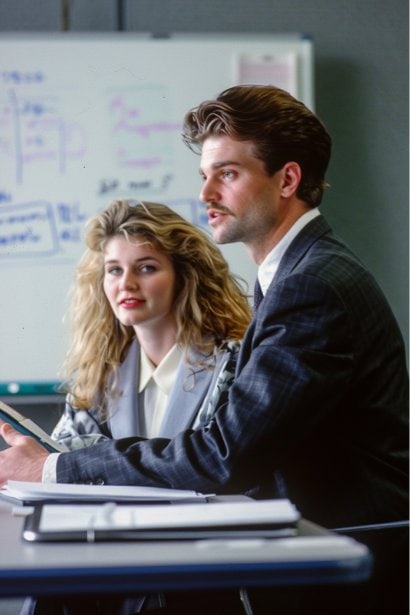What is a Functional Interview? [Understanding the Process and Purpose]

A functional interview is an evaluative conversation typically used in workplace settings to assess a candidate’s abilities related to specific functions or tasks of a job. Unlike traditional interviews that may focus on general traits or past experiences, functional interviews hone in on the practical skills and understanding that an individual has in relation to the operational needs of the role they are applying for.
By examining a person’s competencies and how they apply their knowledge in real-world scenarios, employers can get a better sense of whether a candidate is capable of meeting the demands of a position.
This specialized form of interviewing often involves scenario-based questions, role-playing elements, or practical tasks that mirror the responsibilities of the job. Employers use this method to determine if applicants possess the necessary technical abilities, problem-solving skills, and adaptability required for effective performance.
Functional interviews may also serve to evaluate how a prospect might integrate with a team and align with a company’s culture. As such, they have become an important tool in the occupational rehabilitation field and across various industries looking to match the right person with the right job.
Key Takeaways
- Functional interviews focus on job-specific skills and competencies.
- They involve practical tasks or scenarios to assess candidates’ abilities.
- These interviews are crucial for employers to find suitable candidates for specialized roles.
Understanding Functional Interviews
In the recruitment process, functional interviews are a critical tool used to evaluate a candidate’s practical skills and problem-solving abilities in a specific role. They provide insights into how an individual’s knowledge translates into action.

Definition and Purpose
Functional interviews are designed to assess a candidate’s competency pertaining to the tasks and responsibilities of the job in question. They focus on specific skills and experiences, often utilizing scenarios or problems that the candidate may face in the role.
The main purpose is to predict job performance by gauging both technical abilities and soft skills such as communication and active listening.
Differences Between Functional and Traditional Interviews
While traditional interviews may rely heavily on discussing a candidate’s background and experiences, functional interviews delve deeper into the application of skills.
Traditional interviews often include a series of open-ended questions that allow candidates to express their qualifications and career aspirations.
In contrast, functional interviews revolve around practical exercises or tasks. Feedback is also a crucial part of functional interviews, as it can evaluate an individual’s ability to integrate and use criticism to improve their performance.
| Interview Type | Focus | Assessment Method |
|---|---|---|
| Traditional | General traits and experiences | Open-ended questions about qualifications and career aspirations |
| Functional | Application of skills in real-world scenarios | Practical exercises, tasks, and scenario-based questions |
Typical Format and Structure
The format of a functional interview typically includes:
- Introduction: Setting the stage and explaining the purpose of the interview.
- Skill Assessment: Candidates may be asked to complete specific tasks or to solve real-world problems related to the job.
- Behavioral Questions: These require candidates to draw on past experiences to demonstrate their competencies in action.
- Feedback and Discussion: Candidates receive input on their performance and can discuss how they would integrate the feedback in their working style.
Throughout the functional interview, the emphasis on active listening and clear communication from both interviewers and candidates ensures an effective and comprehensive evaluation.
Preparing for a Functional Interview
A functional interview often focuses on a candidate’s skills and competencies relevant to the role in question. Proper preparation can set the foundation for a successful interaction with the hiring manager.

Research and Practice
Candidates should start by thoroughly researching the company and the specific role of the functional analyst. Understanding the typical day-to-day responsibilities and the preferred work style within the organization can provide crucial context.
Practicing speaking about relevant experiences and skills with a focus on outcomes can enhance a candidate’s confidence and articulate understanding of the position.
Understanding the Role and Company
It is imperative to comprehend the expectations of the functional analyst position and how it fits within the broader framework of the company.
One should study the job description in detail, noting any key competencies or tools mentioned. This information equips candidates to tailor their responses to reflect the company’s needs and culture, thereby directly addressing the hiring manager’s unstated questions.
Practicing STAR Method Responses
To effectively convey experiences during the interview, candidates should prepare responses using the STAR (Situation, Task, Action, Result) method.
This structured approach allows for clear and concise storytelling that highlights an individual’s problem-solving capabilities.
Preparing possible scenarios beforehand, and even rehearsing answers to receive feedback, solidifies this technique as a strategic asset for candidates.
Key Skills and Competencies Assessed
A functional interview aims to evaluate an applicant’s specific capabilities directly relevant to the role in question. It scrutinizes his or her expertise and practical application of skills in real-world scenarios.

Technical and Functional Expertise
A critical area of assessment is the Technical and Functional Expertise of the candidates.
The interviewer will assess knowledge of industry-specific tools and technologies. It’s essential to determine if the individual possesses the necessary technical know-how to perform the functions of the job at a high level.
Problem-Solving and Analytical Thinking
The ability to engage in Problem-Solving and Analytical Thinking is also paramount.
Individuals are presented with hypothetical or past situations requiring troubleshooting or functional analysis. Interviewers observe how candidates break down complex problems, analyze data, and develop solutions.
Attention to detail is a subtle yet critical trait evaluated here.
Communication and Collaboration
Lastly, success within any organizational function often hinges on effective Communication and Collaboration.
Candidates are gauged on their ability to articulate ideas clearly and work alongside others to achieve common goals. This includes both verbal and written communication skills and often involves role-play scenarios to test these competencies in a team environment.
Conducting Functional Interviews As an Employer
When an employer decides to conduct functional interviews, the aim is to assess a candidate’s skills and their ability to add value to the company. This process should be thoughtfully designed to elicit specific information that will inform the hiring decision.

Designing Effective Functional Interview Questions
Employers should craft functional interview questions that probe into a candidate’s concrete experiences and skills related to the job.
The questions should be open-ended to encourage detailed responses and may include situational prompts that allow candidates to describe how they have applied their skills in the past.
It’s important to cover a range of topics—from problem-solving abilities to interpersonal skills—and to prepare follow-up questions to dig deeper into candidates’ responses.
- Problem-Solving: “Can you describe a situation where you developed a solution to a work-related problem?”
- Interpersonal Skills: “Tell me about a time when you had to adapt your communication style to successfully work with a team.”
Evaluating Candidate Responses
Evaluating candidate responses requires focusing on how their experiences align with the job’s requirements.
Employers should listen for stories of how candidates have successfully applied important skills in their past roles and consider if those skills are transferable to the current position.
Responses should be assessed based on criteria like relevance, specificity, and the demonstration of critical thinking.
- Relevance: Did the candidate’s response directly address the question?
- Specificity: Was the candidate able to provide specific examples?
- Critical Thinking: How well did the candidate articulate their thought process and the solutions they implemented?
Providing Constructive Feedback
After the interview, offering constructive feedback can be beneficial even if the candidate is not selected.
This feedback should be specific, addressing areas of strength and opportunities for development.
It demonstrates the employer’s commitment to a transparent and developmental hiring process, which can enhance the company’s reputation in the job market.
Common Topics in Functional Interviews
Functional interviews often explore the practical aspects of professional roles, diving deep into the specific skills and abilities required to perform a job effectively. These structured conversations focus on identifying how candidates have used their experience in previous situations to contribute positive outcomes in their work.

Project Management and Systems Development
Project management principles are essential in most professional settings, particularly when discussing systems development.
Interviewers may inquire about a candidate’s experience with managing deadlines, resource allocation, and team dynamics.
They could also explore knowledge around software development lifecycles, the ability to troubleshoot systems issues, and proficiency in using project management tools.
Understanding how a candidate aligns project goals with company objectives can be highly indicative of their potential success in the role.
Stakeholder Engagement and Requirements Gathering
Engaging with stakeholders is a critical component of many jobs, especially when it involves gathering project requirements.
Functional interviews may probe into a candidate’s strategies for working with stakeholders—highlighting the importance of communication skills and empathy.
Interviewers might ask for specific examples of how the interviewee has identified and managed stakeholders’ expectations and how they ensured that project deliverables met those requirements.
Risk Assessment and Management
Identifying, assessing, and managing risks is a competency that spans across various industries.
In a functional interview, candidates may be asked to discuss how they have previously conducted risk assessments and how they responded to potential threats to project viability.
This can include a conversation on the development of mitigation strategies, the ability to foresee risks, and the effectiveness of their management skills in preserving the integrity of project outcomes.
Interviewers are keen to understand how a candidate’s risk management processes can contribute to the overall stability and success of a project.
Industry-Specific Functional Interviews
Functional interviews are specialized assessments designed to evaluate a candidate’s competencies in a specific industry segment. These interviews focus on skills and knowledge pertinent to roles within that industry, ensuring that the candidate’s experience aligns with job requirements.
Technology and Software Solutions
In the realm of technology and software, functional interviews often assess proficiency in specific programming languages or software development methodologies.
Recruiters may probe for concrete examples of past projects or collaborative efforts on software solution initiatives.
For instance, candidates might be asked about their direct experience with agile development practices or the integration of new technologies into existing systems.

Retail and Sales Strategies
When it comes to retail and sales, functional interviews delve into a candidate’s ability to drive sales and understand consumer behavior.
They may be presented with scenarios requiring them to draft sales strategies or address retail challenges.
It’s crucial for candidates to demonstrate their track record in improving sales metrics and adapting to retail market trends.
Marketing and Customer Engagement
In marketing and customer engagement environments, functional interviews focus on one’s strategy formulation and execution capabilities.
Marketing professionals might be assessed on their skills in conceptualizing campaigns that align with consumer expectations and brand identity.
Additionally, their approach to fostering customer satisfaction and loyalty is often scrutinized through detailed discussion of past marketing initiatives.
Post-Interview Processes
After the interview concludes, the focus shifts to meticulously analyzing the candidate’s performance to determine their suitability for the position.
Processes include thorough evaluations, providing meaningful feedback, and establishing the next steps for each candidate.

Candidate Evaluation and Decision Making
Evaluation committees or hiring managers often convene to discuss and assess each candidate’s responses to interview questions, using structured criteria to ensure fairness and consistency.
Decision-making is guided by weighted factors, such as relevant experience, cultural fit, and problem-solving abilities.
Scores are sometimes consolidated into tabular formats to visually compare candidates:
| Criteria | Candidate A | Candidate B | Candidate C |
|---|---|---|---|
| Experience | 8 | 7 | 9 |
| Cultural Fit | 7 | 9 | 6 |
| Problem Solving | 9 | 8 | 7 |
| Total | 24 | 24 | 22 |
Their goal is to reach a consensus on which candidates best meet the job requirements.
Providing Feedback to Candidates
Candidates typically appreciate feedback on their interview, which can be vital for their professional development.
Respectful and constructive feedback, particularly if they are not selected, is considered a best practice. Feedback may cover areas of strength and recommendations for improvement, allowing each candidate to understand the rationale behind the hiring decision.
Further Steps and Follow-Ups
Finalists might be invited to participate in additional interviews or assessments.
These steps are communicated clearly, including any follow-up questions or tasks for the candidate to complete.
Applicants not proceeding to the next stages receive prompt notifications to keep them informed.
Documenting each candidate’s status and updating them on timelines is an integral part of maintaining professionalism throughout the hiring process.
Leveraging Social Media and Networks
Social media platforms offer invaluable tools for conducting functional interviews, allowing for a deep dive into a candidate’s professional presence and expertise.

Using LinkedIn and Twitter for Insights
LinkedIn’s rich professional profiles and Twitter’s real-time content sharing provide comprehensive views into a candidate’s career progression and industry engagement.
Recruiters and hiring managers can use LinkedIn to verify employment history, spot endorsements, and review articles a candidate may have published.
Similarly, Twitter can reveal a candidate’s communication style and industry conversations they are part of, offering context that may not be evident from a resume alone.
Engaging with Professional Groups on Facebook
Facebook is more than a social network for personal use; it hosts numerous professional groups where industry-specific dialogues occur.
Recruiters can observe how candidates interact within these groups, noting their contributions to discussions and their ability to engage with peers.
Such interactions demonstrate a candidate’s active involvement and recognition in their field.
Establishing Credibility and Expertise Online
Candidates often use social media to showcase their professional achievements and thought leadership.
Recruiters can evaluate the substance of a candidate’s online discussions, articles they have written, or presentations they have shared, which can serve as evidence of their expertise and credibility.
A well-maintained online presence can signal a candidate’s dedication to their professional development and their standing in their industry.
Conclusion
In assessing the outcomes of occupational rehabilitation, studies indicate that functional interviews effectively identify an individual’s capabilities and limitations in relation to their work tasks.
Through the interview process, professionals are able to tailor rehabilitation programs that align with the individual’s specific needs, potentially leading to better recovery outcomes.
The reliability of functional interviews has been supported by research suggesting high levels of inter-rater agreement. However, variability over time with different raters indicates the importance of a consistent approach to maximize the interview’s effectiveness.
Functional interviews have also been shown to uncover nuances in patient conditions that may not be evident in formal assessments alone.
For instance, breast cancer patients disclosed more cognitive issues in interviews as compared to standardized screenings, suggesting that interviews can reveal critical information impacting treatment approaches.
Moreover, the impact of cognitive factors, like delirium, on physical recovery post-injury suggests that functional interviews can play a crucial role in identifying non-physical barriers to recovery.
It reinforces the strategy of integrating cognitive assessments within a holistic functional interview process.






